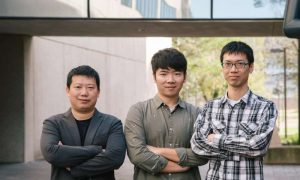
University of Houston researchers Yan Yao, left, Hui Dong and Yanliang Leonard Liang. Photo Credit: University of Houston
A new version of high-energy magnesium batteries has been discovered by researchers from the University of Houston and the Toyota Research Institute of America, according to Phys.org. The battery operates with limited electrolytes while using an organic electrode, allowing it to store and discharge much more energy than earlier magnesium batteries.
Yan Yao, an ECS member, UH Student Chapter faculty advisor, and an associate professor of electrical and computer engineering at the UH, said the researchers identified chloride—in the commonly used electrolyte—as a contributor to magnesium batteries’ sluggish performance.
Yao, a principal investigator with the Texas Center for Superconductivity at UH, used the chloride-free electrolyte to test organic quinone polymer cathodes with a magnesium metal anode; the battery remaining stable through 2,500 cycles.
Magnesium batteries are particularly exciting as magnesium itself offers far more natural advantages over lithium.
“Magnesium is much more abundant, and it is safer,” says Yao. “People hope a magnesium battery can solve the risks of lithium batteries.”
In addition, magnesium also not susceptible to breaches in its internal structure—known as dendrites—that can cause lithium batteries to explode and catch fire, unlike lithium-ion batteries
Still, magnesium batteries won’t be commercially competitive for some time, that is until they can store and discharge large amounts of energy.
Nevertheless, Yao hopes to change that and plans on further improving the capacity and voltage of magnesium batteries to one day compete against lithium batteries.
Yao is not alone in his search for the next battery breakthrough. Each year, researchers—like Yao and his team—come together to share their work and the latest developments in the field at ECS’s biannual meetings. These meetings serve as a hub for scientists, engineers and industry leaders from all over the world to come together and share information, discuss their work, gain valuable feedback and new insights, network, and discover new opportunities.
The next meeting is the 235th ECS Meeting, taking place in Dallas, Texas from May 26–May 30, 2019. Opportunities for continuing education include short courses, such as topics on Battery Safety and Failure Modes, which focuses on improving lithium-ion battery safety design without compromising performance. Learn more here and stay up-to-date on the latest 235th ECS Meeting developments.


